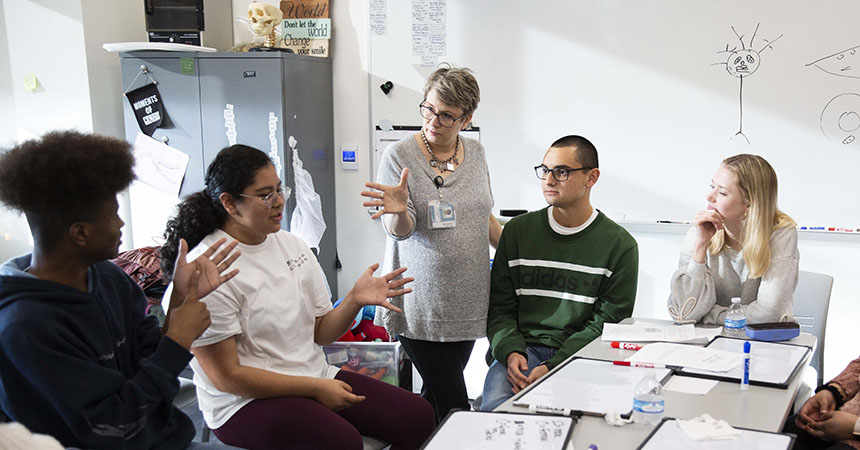HSC students provide ‘invaluable’ support as tutors, mentors to TABS students
By Diane Smith
Ivette Robledo stays after school to get extra help in science – a routine aimed at helping her ace freshman biology at the Texas Academy of Biomedical Sciences.
The after-school instruction is the work of Tutors for the Texas Academy of Biomedical Sciences, a student organization at The University of North Texas Health Science Center in Fort Worth.
“It helps because we see the same tutors every week, when you see them so many times, you start to make connections,” Robledo said.
Members of the tutoring group – students from the Texas College of Osteopathic Medicine and Graduate School of Biomedical Sciences – are giving back to the community by mentoring high school students who are considering health care professions.
Tutors meet with the high school students on the TABS campus located in downtown Fort Worth at Tarrant County College. The high school campus is one of the Fort Worth school district’s special-interest programs and is a collaboration among HSC, FWISD, the University of North Texas and Tarrant County College.
“The tutoring the graduate students offer to these high school students in invaluable,” said Rusty Reeves, PhD and professor and director at the Center for Anatomical Sciences in the Graduate School of Biomedical Sciences. “They serve as science content experts by tutoring, but also as mentors.”
Tutoring by HSC students to high school students at TABS dates back about 10 years. But last fall, Andrew “Lendon” Hall, a first-year medical student at TCOM, submitted an application to register Tutors for the Texas Academy of Biomedical Sciences as a campus student organization.
Hall, president and founder of the student organization, said the new HSC student group has 56 members.
Tutors urge high school students to practice strong study habits, including being organized, attending classes, getting enough sleep and reviewing mistakes, Hall said. The tutors help with biology, physics, medical terminology and chemistry.
“I like the fact that we can get help from others who are more experienced than we are,” said Diana Flores, a TABS sophomore who wants to be a doctor. “It helps me know what I don’t know.”
Hall said tutors give high school students an opportunity to see what lies ahead in the medical field and science, including genetics, and enzyme kinetics.
Kathy Elliott, biology teacher at TABS, welcomes the HSC tutors.
“Sometimes they (TABS students) have their favorite tutor who they get with every week – they just come in and it is a fresh voice,” she said.
Elliott said she sees improvement in her students’ work. She said the TABS students respond well to role models who are not that much older than them.
“When we start every year, I tell the tutors, ‘Please, tell them that you also failed a test when you were in high school,” Elliott said.
Hall said the HSC tutors try to offer tips on how to overcome any frustrations that can creep in during challenging classes. They remind teens not to lose faith in their dreams.
“If you believe in yourself and commit to something you want to do, eventually there is a good chance – if you put the work in – it will become a reality,” Hall said.







Social media